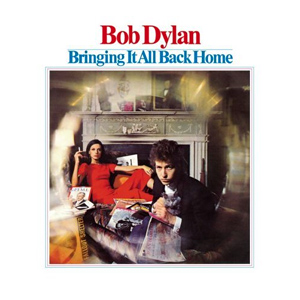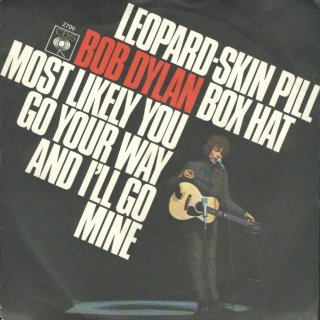
Blood on the Tracks is the fifteenth studio album by American singer-songwriter Bob Dylan, released on January 20, 1975, by Columbia Records. The album marked Dylan's return to Columbia after a two-album stint with Asylum Records. Dylan began recording the album at an A & R studio in New York City in September 1974. In December, shortly before Columbia was due to release the album, Dylan abruptly re-recorded much of the material in Sound 80 studio in Minneapolis. The final album contains five tracks recorded in New York and five from Minneapolis. The album’s songs have been linked to tensions in Dylan's personal life, including his estrangement from his then-wife Sara. One of their children, Jakob Dylan, has described the songs as "my parents talking." In interviews, Dylan has denied that the songs on the album are autobiographical.

Dont Look Back is a 1967 American documentary film directed by D. A. Pennebaker that covers Bob Dylan's 1965 concert tour in England.

Highway 61 Revisited is the sixth studio album by the American singer-songwriter Bob Dylan, released on August 30, 1965, by Columbia Records. Dylan continued the musical approach of his previous album Bringing It All Back Home (1965), using rock musicians as his backing band on every track of the album in a further departure from his primarily acoustic folk sound, except for the closing track, the 11-minute ballad "Desolation Row". Critics have focused on the innovative way Dylan combined driving, blues-based music with the subtlety of poetry to create songs that captured the political and cultural climate of contemporary America. Author Michael Gray argued that, in an important sense, the 1960s "started" with this album.

Bringing It All Back Home is the fifth studio album by the American singer-songwriter Bob Dylan, released in March 1965 by Columbia Records. In a major transition from his earlier sound, it was Dylan's first album to incorporate electric instrumentation, which caused controversy and divided many in the contemporary folk scene.

"Mr. Tambourine Man" is a song written by Bob Dylan, released as the first track of the acoustic side of his March 1965 album Bringing It All Back Home. The song's popularity led to Dylan recording it live many times, and it has been included in multiple compilation albums. It has been translated into other languages and has been used or referenced in television shows, films, and books.
"Chimes of Freedom" is a song written and performed by Bob Dylan and featured on his Tom Wilson produced 1964 album Another Side of Bob Dylan. The song depicts the thoughts and feelings of the singer and his companion as they shelter from a lightning storm under a doorway after sunset. The singer expresses his solidarity with the downtrodden and oppressed, believing that the thunder is tolling in sympathy for them.
"Sad Eyed Lady of the Lowlands" is a song by the American singer-songwriter Bob Dylan. First released as the final track on Dylan's seventh studio album, Blonde on Blonde (1966), the song lasts 11 minutes and 23 seconds, and occupies the entire fourth side of the double album. The song was written by Dylan and produced by Bob Johnston. The recording session began at 6 pm on February 15, 1966, at Columbia Studio A, Nashville, Tennessee, but Dylan worked on the lyrics for several hours while the experienced Nashville session musicians hired to accompany him stood by. Four takes were recorded in the early hours of February 16; the final recording was released on Blonde on Blonde. The music is a waltz in 6/8 time.
Peter Morris Green is a British classical scholar and novelist noted for his works on the Greco-Persian Wars, Alexander the Great and the Hellenistic Age of ancient history, generally regarded as spanning the era from the death of Alexander in 323 BC up to either the date of the Battle of Actium or the death of Augustus in 14 AD. Green's most famous books are Alexander of Macedon, a historical biography first issued in 1970, then in a revised and expanded edition in 1974, which was first published in the United States in 1991; his Alexander to Actium, a general account of the Hellenistic Age, and other works. He is the author of a translation of the Satires of the Roman poet Juvenal, now in its third edition. He has also contributed poems to many journals, including to Arion and the Southern Humanities Review.

"Stuck Inside of Mobile with the Memphis Blues Again" is a song by American singer-songwriter Bob Dylan from his seventh studio album, Blonde on Blonde (1966). The song was written by Dylan and produced by Bob Johnston. It has nine verses, each featuring a distinct set of characters and circumstances. All 20 takes of "Stuck Inside of Mobile with the Memphis Blues Again" were recorded in the early hours of February 17, 1966, at Columbia Records's A Studio in Nashville, Tennessee, with the last take selected for the album. This version also appears on Dylan's second compilation album, Bob Dylan's Greatest Hits Vol. II (1971).

Bob Dylan is an American singer-songwriter. Often considered to be one of the greatest songwriters in history, Dylan has been a major figure in popular culture over his 60-year career. He rose to prominence in the 1960s, when his songs "Blowin' in the Wind" (1963) and "The Times They Are a-Changin'" (1964) became anthems for the civil rights and antiwar movements. Initially modeling his style on Woody Guthrie's folk songs, Robert Johnson's blues, and what he called the "architectural forms" of Hank Williams's country songs, Dylan added increasingly sophisticated lyrical techniques to the folk music of the early 1960s, infusing it "with the intellectualism of classic literature and poetry". His lyrics incorporated political, social, and philosophical influences, defying pop music conventions and appealing to the decade's burgeoning counterculture.

"I Want You" is a song by the American singer-songwriter Bob Dylan, which was released as a single in June 1966, and, later that month, on his seventh studio album, Blonde on Blonde. The song was written by Dylan, and produced by Bob Johnston. The song has been interpreted as a straightforward expression of lust, although critics have highlighted that the symbolism of the song is complex. It was the last song recorded for Blonde on Blonde, with several takes recorded in the early hours of March 10, 1966. It was included on Bob Dylan's Greatest Hits (1967). The song has received a largely positive critical reception, with a number of commentators highlighting Dylan's use of imagery, although some of the meanings are obscure.
"High Water " is a song written and performed by the American singer-songwriter Bob Dylan, released as the seventh track on his 31st studio album "Love and Theft" in 2001 and anthologized on the compilation album Dylan in 2007. Like much of Dylan's 21st century output, he produced the track himself under the pseudonym Jack Frost.

"Most Likely You Go Your Way and I'll Go Mine", or "Most Likely You Go Your Way (and I'll Go Mine)", is a song by American singer-songwriter Bob Dylan. It was released as the first track on side three of his seventh studio album Blonde on Blonde (1966). The song was written by Dylan and produced by Bob Johnston. Dylan recounted that he had probably written the song after the end of a relationship. The song's narrator criticizes the lies and weakness of a woman, and says that he finds it hard to care. The final verse establishes that the woman has been unfaithful to the narrator by having a relationship with another man, as he suspected all along.
Martin Bronstein is a British-Canadian actor, writer, columnist, broadcaster and journalist.
Clinton Heylin is an English author. Heylin has written extensively about popular music, especially on the life and work of Bob Dylan.

"Damaged Goods" is a song by English post-punk band Gang of Four. Acting as their debut single, it was released on 13 October 1978 through independent record label Fast Product. Produced by Fast Product owner Bob Last under the alias "Fast Product", the single received critical acclaim, prompting the band to sign to major label EMI. The title track and "Love Like Anthrax" were re-recorded for Gang of Four's debut album Entertainment! in 1979 and the whole EP was included in the Fast Product compilation Mutant Pop in 1980.

"Wigwam" is a song by Bob Dylan that was released on his 1970 album Self Portrait. It was a hit single that reached the Top 10 in several countries worldwide. The song's basic track, including "la-la" vocals, was recorded in early March 1970 in New York City. Later that month, producer Bob Johnston had brass instrument overdubs added to the track; these were recorded in Nashville, Tennessee at a session without Dylan present.
"Lord Protect My Child" is a song written by Bob Dylan, who recorded it at New York City's The Power Station in ten takes on May 2, 1983. The song is an outtake from Dylan's album Infidels that was later included in The Bootleg Series Volumes 1–3 1961–1991 on Volume 3. It is not known why Dylan decided not to include "Lord Protect My Child" on Infidels. It is a Christian song, the lyrics of which express concern for Dylan's child. Reviewer Jonathan Lethem called the song "an achingly candid blues-plea which [provides] a rare glimpse of Bob Dylan-the-parent". Susan Tedeschi, Derek Trucks, and Dave Brubeck performed a cover version of "Lord Protect My Child", which was produced by Chris Brubeck and used as the theme song for the human trafficking documentary film Not My Life.

"Sweetheart Like You" is a song by Bob Dylan that appeared as the second track of his 1983 album Infidels. The song was recorded on April 18, 1983 and released as a single in December 1983, with "Union Sundown" as its B-Side.

"Murder Most Foul" is a song by American singer-songwriter Bob Dylan, the 10th and final track on his 39th studio album, Rough and Rowdy Ways (2020). It was released as the album's lead single on March 27, 2020, through Columbia Records. The song addresses the assassination of John F. Kennedy in the wider context of American political and cultural history. Lasting 16 minutes, 56 seconds, it is the longest song he has released, eclipsing 1997's "Highlands" which runs for 16 minutes, 31 seconds.













